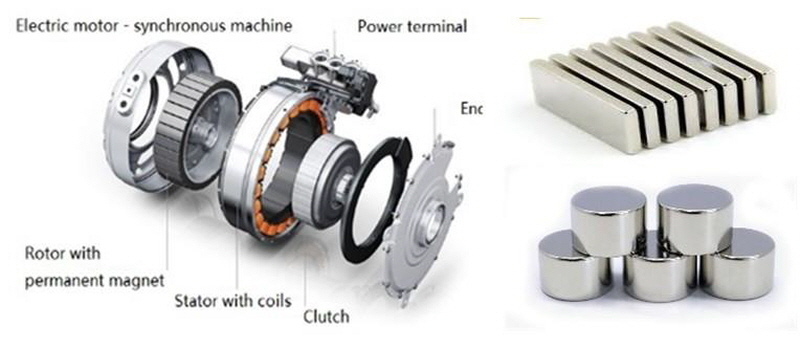한국재료연구원(KIMS, 원장 이정환) 분말재료연구본부 자성재료연구실 이정구 박사 연구팀이 중소기업에서 쉽게 구축하기 어려운 고가의 연구개발 설비 지원 및 기술 자문 등을 통해 중희토류 저감형 희토 자석을 국산화하는 데 성공했다.
성림첨단산업에 기술 지원 중희토류 저감형 희토 자석 국산화
과학기술정보통신부 산하 정부출연연구기관인 한국재료연구원(KIMS, 원장 이정환)이 희토류 영구자석의 국산화 자립 기반을 구축했다.
재료연구원은 분말재료연구본부 자성재료연구실 이정구 박사 연구팀이 중소기업에서 쉽게 구축하기 어려운 고가의 연구개발 설비 지원 및 기술 자문 등을 통해 중희토류 저감형 희토 자석을 국산화하는 데 성공했다고 14일 밝혔다.
희토류 영구자석은 전기자동차 및 풍력발전과 같은 친환경 산업의 핵심 소재이다. 최근 미국의 패권 경쟁 등으로 소재 공급망 확보가 미래 친환경 산업의 중요 요소로 떠오르면서 많은 관심을 받고 있다. 하지만 국내 희토류 영구자석은 전량 수입에 의존하고 있어, 관련 국내 기업들은 이에 대한 해소가 필요한 실정이다.
국내 유일의 희토류 영구자석 제조 기업인 성림첨단산업(주)(대표 공군승)은 2014년부터 전기자동차용 영구자석의 자체 개발을 시작으로 국산화를 위해 노력해왔다. 최근에는 한국산업기술진흥원(KIAT) 융합혁신지원단 기술사업을 통해, 재료연 이정구 박사 연구팀의 ‘이방성 희토류 벌크자석 제조기술’의 기술 자문을 받아 희토류 영구자석 국산화 자립 기반 구축은 물론, 차세대 영구자석 연구개발에도 박차를 가하는 중이다.
성림첨단산업(주)은 희토류 영구자석의 국산화 생산 기술을 확보했지만, 중희토류 원소 저감에 따른 미세조직 제어 공정에는 기술적 애로가 있었다.
재료연 이정구 박사 연구팀은 보유 중인 장비 인프라와 기술적 노하우를 바탕으로 열간변형 공정을 적용해 결정립을 초미세화하고 이차상 생성을 억제해 영구자석의 특성을 최적화하는 기술 자문과 지원을 수행했다.
이를 통해 국산 희토류 영구자석의 품질 향상은 물론, 영구자석의 국산화 및 기술력 향상을 이끌어 국내 공급망 안정화에 이바지할 수 있었다.
재료연 이정구 책임연구원은 “희토류 영구자석의 국산화와 기술력 향상으로 전기자동차의 핵심 소재인 희토류 영구자석의 국내 공급망 안정화를 이뤘다”며 “조만간 세계시장 진출도 기대되는 만큼, 앞으로 글로벌 공급망 핵심 역할을 위해 연구기관과 기업의 공동연구 개발은 물론, 전문가의 현장 맞춤형 기업기술 자문과 지원이 더욱 절실하다”고 말했다.
한편 성림첨단산업(주)는 2019년 소재·부품·장비 강소기업 100에 선정됐다. 2020년 국내 글로벌 완성차 기업에 하이브리드 자동차 구동모터용 희토류 영구자석 납품을 시작했으며, 2022년에는 실질적으로 완전한 국산화 자립 생산에 성공했다. 희토류 영구자석의 국내 전 공정 제조를 위해 대구 현풍 지역에 파일럿 양산공장을 신축해 올해 10월 준공식을 개최한 바 있다. 이를 통해, 한국이 일본과 중국에 이어 세계에서 3번째 희토류 영구자석을 자체 생산할 수 있는 국가로 자리매김하는 데 이바지했다.
